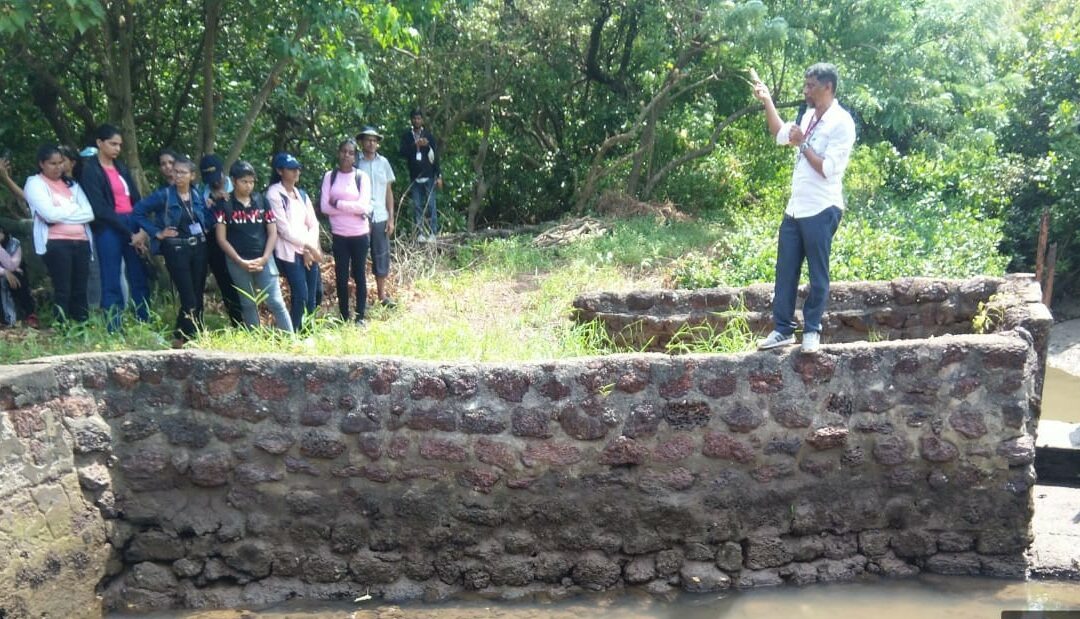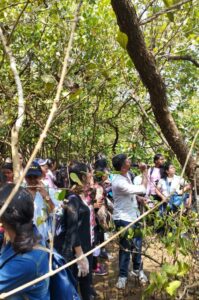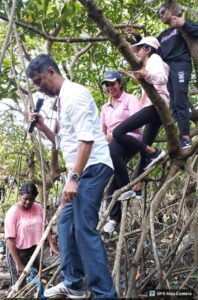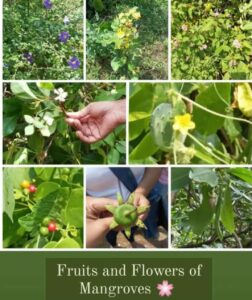The Environment Protection Club (EPC) and the Department of Economics of Carmel College of Arts, Science and Commerce for Women collaborated with the Department of Botany of St. Joseph Vaz College to organize a unique event on the occasion of World Animal Day which is celebrated annually on 4th October. A ‘Mangroves Walk’ was organized under the expert guidance of Resource Person, Rev. Dr. Bolmax Pereira, faculty of Botany at St. Joseph Vaz College who is an erudite researcher and ardent nature advocate. He took the enthusiastic group of over 80 students on a nature trail along the path bordering the thick mangroves forest across the course of the Zuari river flowing through Sancoale, at Cortalim. Using a microphone and portable sound system, Rev. Dr. Pereira meticulously explained to the large group about the types of mangroves and their ecological and economic significance. The walk provided the students with a hands-on experience on mangroves enabling them to identify the species of mangroves, the flora, fruits and the unique characteristics and growth patterns of mangroves. Rev. Dr. Pereira stressed on the role of mangrove ecosystem as a fish nursery and as a carbon sink, thus playing a vital ecological role in mitigating climate change and aiding in sustainable economic development.
The interesting viviparous process of mangroves seed germination when still attached to the mother plant, prospects of honey from avicennia mangroves, mangrove apples and the mangroves root system particularly caught the attention of students who also tried climbing the sturdy and winding mangrove branches. A batch of students of TYBA Economics of Carmel College working on a project on economic significance of the mangrove ecosystem got valuable first-hand information for their project study and interacted with Dr. Pereira on the topic.
The plastic waste thrown by the sea from its belly onto the mangrove marshy land was quite an unsavory sight to behold. EPC volunteers and others collected plastic waste caught in the roots and handed over to the local panchayat.
World Animal Day is celebrated annually on the feast day of St. Francis of Assisi, who is honoured as the Patron Saint of Animals and Ecology.
The interesting viviparous process of mangroves seed germination when still attached to the mother plant, prospects of honey from avicennia mangroves, mangrove apples and the mangroves root system particularly caught the attention of students who also tried climbing the sturdy and winding mangrove branches. A batch of students of TYBA Economics of Carmel College working on a project on economic significance of the mangrove ecosystem got valuable first-hand information for their project study and interacted with Dr. Pereira on the topic.
The plastic waste thrown by the sea from its belly onto the mangrove marshy land was quite an unsavory sight to behold. EPC volunteers and others collected plastic waste caught in the roots and handed over to the local panchayat.
World Animal Day is celebrated annually on the feast day of St. Francis of Assisi, who is honoured as the Patron Saint of Animals and Ecology.




